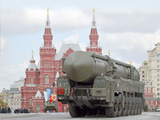|
|
TODAY.AZ / World news
NATO warns Turkey against buying Chinese, Russian air defense systems
26 July 2011 [10:40] - TODAY.AZ
 Ankara would have to operate without NATO’s intelligence information on incoming ballistic missiles if it chooses to buy Chinese or Russian systems for its national air and missile defense program, officials of the Western alliance have warned Turkey.
Ankara would have to operate without NATO’s intelligence information on incoming ballistic missiles if it chooses to buy Chinese or Russian systems for its national air and missile defense program, officials of the Western alliance have warned Turkey.Participating in the ongoing competition to win Turkey’s national air and missile contract are the U.S. partnership between Raytheon and Lockheed Martin, with their Patriot air defense systems; Russia’s Rosoboronexport, marketing the S300; China’s CPMIEC (China Precision Machinery Export-Import Corp.), offering its HQ-9; and the Italian-French Eurosam, maker of the SAMP/T Aster 30. Turkey is planning to make its selection late this year or early next year.
Many Western officials and experts say that since the Russian and the Chinese systems are not compatible with NATO systems, their potential eventual victory might provide them with access to classified NATO information, and as a result may compromise NATO’s procedures.
But despite this criticism, Turkey so far has ruled against expelling the Chinese and Russian options, saying there is no need to exclude them from the Turkish competition.
One Western expert countered that “if, say, the Chinese win the competition, their systems will be in interaction, directly or indirectly, with NATO’s intelligence systems, and this may lead to the leak of critical NATO information to the Chinese, albeit inadvertently. So this is dangerous.”
“NATO won’t let that happen,” another Western official told the Hürriyet Daily News on Monday. “If the Chinese or the Russians win the Turkish contest, their systems will have to work separately. They won’t be linked to NATO information systems.”
This was the first time NATO has strongly urged Turkey against choosing the non-Western systems.
“One explanation is that Turkey itself doesn’t plan to [ultimately] select the Chinese or Russian alternatives, but still is retaining them among their options to put pressure on the Americans and the Europeans to [lower] their prices,” the Western expert said.
Turkey’s long-range air and missile defense systems program (T-Loramids) has been designed to counter both enemy aircraft and missiles.
NATO missile shield
Turkey’s national program is totally separate and independent from NATO’s own plans to design, develop and build its own collective missile shield.
The Western alliance decided during a leaders’ summit meeting in Lisbon in November last year to create the collective missile shield against potential incoming ballistic missiles from rogue countries. Ankara agreed to the decision only after the alliance accepted a Turkish request that Iran or other countries would not be specifically mentioned as potential sources of threats.
NATO now is seeking to deploy a special X-band radar in Turkish territory for the early detection of missiles launched from the region.
Senior U.S. and Turkish officials discussed the matter in mid-July in Istanbul on the sidelines of a visit by U.S. Secretary of State Hillary Clinton, and both sides reported progress toward an eventual deployment of the X-band radar on Turkish soil.
Ideally, in the event of a launch of a ballistic missile from a rogue state, it would be detected by the X-band radar, and U.S.-made SM-3 interceptors – based on U.S. Aegis destroyers to be deployed in the eastern Mediterranean and later possibly in Romania – would then be fired to hit the incoming missile mid-flight.
/Hurriyet Daily News/
URL: http://www.today.az/news/regions/91350.html
 Print version
Print version
Views: 2107
Connect with us. Get latest news and updates.
See Also
- 19 December 2025 [22:24]
Google updates its fast ChatGPT rival - 19 December 2025 [21:22]
Toyota to sell US-made models in Japan 2026 - 19 December 2025 [20:21]
ChatGPT build-in app store - 19 December 2025 [19:21]
US suspends green card lottery - 19 December 2025 [10:00]
Peruvian artist Sol Alexo bridges cultures at Heydar Aliyev Center Exhibition - 19 December 2025 [09:00]
Legendary Mercedes-Benz designer retires - 19 December 2025 [08:00]
Ice and Snow Tourism Expo opens in China - 18 December 2025 [23:31]
President Erdo?an addresses global order, regional stability at 16th Ambassadors Conference - 18 December 2025 [22:49]
Samsung creates energy-efficient server memory for AI data centers - 18 December 2025 [22:23]
Turkiye's First Lady highlights women’s role in peacebuilding and climate action
Most Popular
 President Erdo?an addresses global order, regional stability at 16th Ambassadors Conference
President Erdo?an addresses global order, regional stability at 16th Ambassadors Conference
 Pashinyan calls for restoration of railway links as Azerbaijani fuel shipment heads to Armenia
Pashinyan calls for restoration of railway links as Azerbaijani fuel shipment heads to Armenia
 Azerbaijan, Netherlands highlight positive momentum in political relations
Azerbaijan, Netherlands highlight positive momentum in political relations
 Cotton cultivation boom links tradition with modern value-chain growth
Cotton cultivation boom links tradition with modern value-chain growth
 Diplomacy World magazine releases special issue highlighting COP29 legacy
Diplomacy World magazine releases special issue highlighting COP29 legacy
 President Ilham Aliyev meets with President of United Arab Emirates in Abu Dhabi
President Ilham Aliyev meets with President of United Arab Emirates in Abu Dhabi
 Prosecutor demands life imprisonment for accused war criminal
Prosecutor demands life imprisonment for accused war criminal
